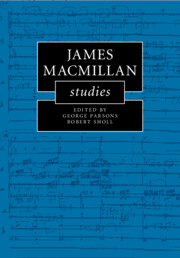Book contents
- James MacMillan Studies
- James MacMillan Studies
- Copyright page
- Contents
- Music Examples
- Tables
- Contributors
- Foreword
- Acknowledgements
- Introduction
- 1 The Struggle with Conviction: A Trio of String Quartets
- 2 Conflicting Modernities and a Modernity of Conflict in James MacMillan’s The World’s Ransoming
- 3 In Memoriam: James MacMillan’s Violin Concerto as Modernist Lament
- 4 Reincarnating The Tryst: The Endurance of a Simple Love Song
- 5 Exquisite Violence: Imagery, Embodiment and Transformation in MacMillan
- 6 Making the Familiar Unfamiliar: MacMillan’s St Luke Passion
- 7 MacMillan’s ‘Mission’ and the Passion Settings
- 8 A Cluster of Gathering Shadows: Exposition and Exegesis in Seven Last Words from the Cross
- 9 James MacMillan’s The Sun Danced: Mary, Miracle and Mysticism
- 10 ‘Shrouded in Doubts and Fears’: The Liturgical Music of James MacMillan
- 11 Containing Chaos? Aspects of Medieval Liturgy in James MacMillan’s Visitatio Sepulchri
- Bibliography
- Index
1 - The Struggle with Conviction: A Trio of String Quartets
Published online by Cambridge University Press: 20 August 2020
- James MacMillan Studies
- James MacMillan Studies
- Copyright page
- Contents
- Music Examples
- Tables
- Contributors
- Foreword
- Acknowledgements
- Introduction
- 1 The Struggle with Conviction: A Trio of String Quartets
- 2 Conflicting Modernities and a Modernity of Conflict in James MacMillan’s The World’s Ransoming
- 3 In Memoriam: James MacMillan’s Violin Concerto as Modernist Lament
- 4 Reincarnating The Tryst: The Endurance of a Simple Love Song
- 5 Exquisite Violence: Imagery, Embodiment and Transformation in MacMillan
- 6 Making the Familiar Unfamiliar: MacMillan’s St Luke Passion
- 7 MacMillan’s ‘Mission’ and the Passion Settings
- 8 A Cluster of Gathering Shadows: Exposition and Exegesis in Seven Last Words from the Cross
- 9 James MacMillan’s The Sun Danced: Mary, Miracle and Mysticism
- 10 ‘Shrouded in Doubts and Fears’: The Liturgical Music of James MacMillan
- 11 Containing Chaos? Aspects of Medieval Liturgy in James MacMillan’s Visitatio Sepulchri
- Bibliography
- Index
Summary
In his 2015 interview with John Palmer, James MacMillan makes a distinction between ‘conviction composers’, and ‘others, like me’ who ‘sometimes struggle with conviction’. It is understandable that giving convincing musical expression to strong religious beliefs might be harder in textless concert works than in liturgical settings, and MacMillan seems to have relished the possible contrasts between concert works that are associated with religious topics and those where any engagement with extra-musical themes is less explicit. Two of the three numbered string quartets have titles, and the second has religious connotations that deal with the ‘drama’ of the Jewish Seder Night rituals. The first quartet can also be interpreted as dramatic, and it could well have been an impatience with this aspect that led MacMillan, in a reference to his third quartet, to declare that he was conscious of ‘leaving the extra-musical starting points behind’, writing music that ‘was just the notes and nothing but the notes’. My analysis of all three quartets explores the possibilities of narrative and characterisation in the light of stylistic and expressive qualities that seem to resist any aspirations to pure abstraction, even when direct connections with MacMillan’s more ‘mainstream’ texted compositions are less obvious.
Keywords
- Type
- Chapter
- Information
- James MacMillan Studies , pp. 10 - 27Publisher: Cambridge University PressPrint publication year: 2020

